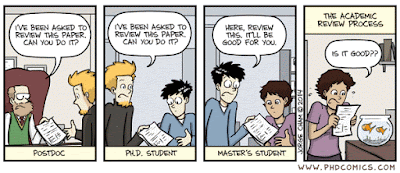Multilitteratus Incognitus
Pondering what to learn next 🤔
Who's a teacher?
%11-%12-%2015, %R #rhizoANT, ANT, EdTech, LMS, MOOC, research, review, technology, xMOOCWith the semester over, and the brain working on momentum, I've decided to capitalize on the spare brain-power, and time, to finally read a book that I agreed to write a review for back in the summer (yeah, I know - a tad bit late...). The book is a collection of articles titled Macro-Level Learning through Massive Open Online Courses (MOOCs): Strategies and Predictions for the Future (an IGI global title). I'll come back to the topic of the book as a whole after I am done with this process. I think that going through chapter-by-chapters, picking and reacting to some things that piqued (and poked at) my interests is a little more interesting that trying to condense 15 chapters into one book review. This is sort of what I did with the #rhizoANT review.
Chapter 1 is titled Mining a MOOC: What Our MOOC Taught Us about Professional Learning, Teaching, and Assessment. The abstract gives us a sense of the article:
In July 2014, a massive open online course (MOOC) entitled The Assessment and Teaching of 21st Century Skills (ATC21S) was offered within the University of Melbourne's programme. Designed as a research engagement and dissemination initiative, the ATC21S MOOC enrolled 18,000 education practitioners, predominantly interested in teaching and assessment of complex 21st century skills. This chapter describes the experience of developing and teaching in the MOOC, and of learning through it. The authors suggest areas for ongoing research, and highlight areas in which MOOCs may stimulate broader change. This chapter commences the dialogue for the opening book section – policy issues in MOOCs Design, and responds to the topic of ‘emerging technology and change management issues for eLearning in the MOOCS environment.'This article seemed a bit like an action research project, which is fine, but it did not really add to my own understanding of MOOCs. It does provide some data, which in aggregate can be considered as part of the xMOOC learning environment, but the MOOC aspect of the article didn't provide much for me personally. On the other hand, some comments, and assumptions about technology, did pique my interest a bit. For example, right from the start the authors comment that MOOC platforms are still in their infancy. While this may be true when discussing platforms like coursera and udacity, we've had the LMS around for at least 20 years.
Another comment "The platform determines the organization of the materials and the processes of the course..." while, in it does ring true, it seems to me that taken together with the previous quote is sort of an excuse to work within the confines of what the MOOC LMS allows. While I don't consider myself an EduPunk, it's kind of hard to think of MOOCs (these days) and conceive of people painting within the lines of the LMS when what kicked off MOOCs was this sense of the untamed and MacGyvering to reach your aims. In other words, your aims were not determined by what you had available.
The authors asks us to consider that "'teaching' should not be conflated with what a teacher does." This is true, in a sense. What a teacher does is teaching, however teaching isn't solely defined by the actions of a teacher. Fellow students can be teachers as well, if we - for example - take a Vygotskian view of the more knowledgeable other who helps scaffold fellow learners to new learning. That said, I do find it a bit problematic to consider the platform as a teacher "who tirelessly organise[s] the learning experience".
While I do think that technologies can be actors in a learning network (at least from what I've read and experienced with the ANT readings) and they can influence how actors connect and work with other actors and knowledge in that network, I think that the authors of this paper are giving technology, and the LMS in particular, too much of an active role. The LMS is an inert piece of technology. It does not organize anything. A human actor acts to organize the learning materials, and perhaps learning opportunities, that occur in that learning network. While, from a connectivist view (if I am interpreting connectivism correctly), the learner can access 'learning' from a non-human appliance, I don't think that the act of providing materials is the same as being a teacher.
In their conclusions, the authors indicate that the "distinctive teaching power of a MOOC arises from the combine 'teaching' efforts of three components: a course team of collaborating professionals; a digital platform that tirelessly organises and provides feedback to learners; and the peer teaching capabilities of a collegial, experienced, qualified, group of participants".
Those three components, in my view, are available in traditional online courses as well, so I am not sure how MOOCs are different in this view. However, I do think that there is a subtle distinction here around the concept of peers: they are collegial, experiences, and qualified. This to me indicates that MOOCs do have pre-requisites (and those should be encouraged during development) and there is an aspect of collaboration hinted at with the collegial piece. I don't know if I've read in other pieces in the past about "ideal" learner characteristics for MOOCs.
Next blog post, chapter 2. What do you think of chapter 1?
Citations:
Milligan, S., & Griffin, P. (2015). Mining a MOOC: What Our MOOC Taught Us about Professional Learning, Teaching, and Assessment. In E. McKay, & J. Lenarcic (Eds.) Macro-Level Learning through Massive Open Online Courses (MOOCs): Strategies and Predictions for the Future (pp. 1-24). Hershey, PA: Information Science Reference. doi:10.4018/978-1-4666-8324-2.ch001
Comments

Archive
Dec 2025 (2)
Nov 2025 (2)
Sep 2025 (1)
Aug 2025 (1)
Jun 2025 (1)
Apr 2025 (1)
Mar 2025 (1)
Feb 2025 (1)
Jan 2025 (1)
Dec 2024 (2)
Oct 2024 (2)
Sep 2024 (1)
Aug 2024 (5)
Nov 2023 (1)
Aug 2023 (1)
Jul 2023 (1)
May 2023 (1)
Apr 2023 (4)
Mar 2023 (5)
Feb 2023 (2)
Dec 2022 (6)
Nov 2022 (1)
Sep 2022 (1)
Aug 2022 (2)
Jul 2022 (3)
Jun 2022 (1)
May 2022 (1)
Apr 2022 (2)
Feb 2022 (2)
Nov 2021 (2)
Sep 2021 (1)
Aug 2021 (1)
Jul 2021 (2)
Jun 2021 (1)
May 2021 (1)
Oct 2020 (1)
Sep 2020 (1)
Aug 2020 (1)
May 2020 (2)
Apr 2020 (2)
Feb 2020 (1)
Dec 2019 (3)
Oct 2019 (2)
Aug 2019 (1)
Jul 2019 (1)
May 2019 (1)
Apr 2019 (1)
Mar 2019 (1)
Dec 2018 (5)
Nov 2018 (1)
Oct 2018 (2)
Sep 2018 (2)
Jun 2018 (1)
Apr 2018 (1)
Mar 2018 (2)
Feb 2018 (2)
Jan 2018 (1)
Dec 2017 (1)
Nov 2017 (2)
Oct 2017 (1)
Sep 2017 (2)
Aug 2017 (2)
Jul 2017 (2)
Jun 2017 (4)
May 2017 (7)
Apr 2017 (3)
Feb 2017 (4)
Jan 2017 (5)
Dec 2016 (5)
Nov 2016 (9)
Oct 2016 (1)
Sep 2016 (6)
Aug 2016 (4)
Jul 2016 (7)
Jun 2016 (8)
May 2016 (9)
Apr 2016 (10)
Mar 2016 (12)
Feb 2016 (13)
Jan 2016 (7)
Dec 2015 (11)
Nov 2015 (10)
Oct 2015 (7)
Sep 2015 (5)
Aug 2015 (8)
Jul 2015 (9)
Jun 2015 (7)
May 2015 (7)
Apr 2015 (15)
Mar 2015 (2)
Feb 2015 (10)
Jan 2015 (4)
Dec 2014 (7)
Nov 2014 (5)
Oct 2014 (13)
Sep 2014 (10)
Aug 2014 (8)
Jul 2014 (8)
Jun 2014 (5)
May 2014 (5)
Apr 2014 (3)
Mar 2014 (4)
Feb 2014 (8)
Jan 2014 (10)
Dec 2013 (10)
Nov 2013 (4)
Oct 2013 (8)
Sep 2013 (6)
Aug 2013 (10)
Jul 2013 (6)
Jun 2013 (4)
May 2013 (3)
Apr 2013 (2)
Mar 2013 (8)
Feb 2013 (4)
Jan 2013 (10)
Dec 2012 (11)
Nov 2012 (3)
Oct 2012 (8)
Sep 2012 (17)
Aug 2012 (15)
Jul 2012 (16)
Jun 2012 (19)
May 2012 (12)
Apr 2012 (12)
Mar 2012 (12)
Feb 2012 (12)
Jan 2012 (13)
Dec 2011 (14)
Nov 2011 (19)
Oct 2011 (21)
Sep 2011 (31)
Aug 2011 (12)
Jul 2011 (8)
Jun 2011 (7)
May 2011 (3)
Apr 2011 (2)
Mar 2011 (8)
Feb 2011 (5)
Jan 2011 (6)
Dec 2010 (6)
Nov 2010 (3)
Oct 2010 (2)
Sep 2010 (2)
Aug 2010 (4)
Jul 2010 (9)
Jun 2010 (8)
May 2010 (5)
Apr 2010 (4)
Mar 2010 (2)
Feb 2010 (3)
Jan 2010 (7)
Dec 2009 (9)
Nov 2009 (5)
Oct 2009 (9)
Sep 2009 (13)
Aug 2009 (13)
Jul 2009 (13)
Jun 2009 (13)
May 2009 (15)
Apr 2009 (15)
Mar 2009 (14)
Feb 2009 (13)
Jan 2009 (10)
Dec 2008 (12)
Nov 2008 (6)
Oct 2008 (8)
Sep 2008 (2)
Jun 2008 (1)
May 2008 (6)
Apr 2008 (1)
Nov 2025 (2)
Sep 2025 (1)
Aug 2025 (1)
Jun 2025 (1)
Apr 2025 (1)
Mar 2025 (1)
Feb 2025 (1)
Jan 2025 (1)
Dec 2024 (2)
Oct 2024 (2)
Sep 2024 (1)
Aug 2024 (5)
Nov 2023 (1)
Aug 2023 (1)
Jul 2023 (1)
May 2023 (1)
Apr 2023 (4)
Mar 2023 (5)
Feb 2023 (2)
Dec 2022 (6)
Nov 2022 (1)
Sep 2022 (1)
Aug 2022 (2)
Jul 2022 (3)
Jun 2022 (1)
May 2022 (1)
Apr 2022 (2)
Feb 2022 (2)
Nov 2021 (2)
Sep 2021 (1)
Aug 2021 (1)
Jul 2021 (2)
Jun 2021 (1)
May 2021 (1)
Oct 2020 (1)
Sep 2020 (1)
Aug 2020 (1)
May 2020 (2)
Apr 2020 (2)
Feb 2020 (1)
Dec 2019 (3)
Oct 2019 (2)
Aug 2019 (1)
Jul 2019 (1)
May 2019 (1)
Apr 2019 (1)
Mar 2019 (1)
Dec 2018 (5)
Nov 2018 (1)
Oct 2018 (2)
Sep 2018 (2)
Jun 2018 (1)
Apr 2018 (1)
Mar 2018 (2)
Feb 2018 (2)
Jan 2018 (1)
Dec 2017 (1)
Nov 2017 (2)
Oct 2017 (1)
Sep 2017 (2)
Aug 2017 (2)
Jul 2017 (2)
Jun 2017 (4)
May 2017 (7)
Apr 2017 (3)
Feb 2017 (4)
Jan 2017 (5)
Dec 2016 (5)
Nov 2016 (9)
Oct 2016 (1)
Sep 2016 (6)
Aug 2016 (4)
Jul 2016 (7)
Jun 2016 (8)
May 2016 (9)
Apr 2016 (10)
Mar 2016 (12)
Feb 2016 (13)
Jan 2016 (7)
Dec 2015 (11)
Nov 2015 (10)
Oct 2015 (7)
Sep 2015 (5)
Aug 2015 (8)
Jul 2015 (9)
Jun 2015 (7)
May 2015 (7)
Apr 2015 (15)
Mar 2015 (2)
Feb 2015 (10)
Jan 2015 (4)
Dec 2014 (7)
Nov 2014 (5)
Oct 2014 (13)
Sep 2014 (10)
Aug 2014 (8)
Jul 2014 (8)
Jun 2014 (5)
May 2014 (5)
Apr 2014 (3)
Mar 2014 (4)
Feb 2014 (8)
Jan 2014 (10)
Dec 2013 (10)
Nov 2013 (4)
Oct 2013 (8)
Sep 2013 (6)
Aug 2013 (10)
Jul 2013 (6)
Jun 2013 (4)
May 2013 (3)
Apr 2013 (2)
Mar 2013 (8)
Feb 2013 (4)
Jan 2013 (10)
Dec 2012 (11)
Nov 2012 (3)
Oct 2012 (8)
Sep 2012 (17)
Aug 2012 (15)
Jul 2012 (16)
Jun 2012 (19)
May 2012 (12)
Apr 2012 (12)
Mar 2012 (12)
Feb 2012 (12)
Jan 2012 (13)
Dec 2011 (14)
Nov 2011 (19)
Oct 2011 (21)
Sep 2011 (31)
Aug 2011 (12)
Jul 2011 (8)
Jun 2011 (7)
May 2011 (3)
Apr 2011 (2)
Mar 2011 (8)
Feb 2011 (5)
Jan 2011 (6)
Dec 2010 (6)
Nov 2010 (3)
Oct 2010 (2)
Sep 2010 (2)
Aug 2010 (4)
Jul 2010 (9)
Jun 2010 (8)
May 2010 (5)
Apr 2010 (4)
Mar 2010 (2)
Feb 2010 (3)
Jan 2010 (7)
Dec 2009 (9)
Nov 2009 (5)
Oct 2009 (9)
Sep 2009 (13)
Aug 2009 (13)
Jul 2009 (13)
Jun 2009 (13)
May 2009 (15)
Apr 2009 (15)
Mar 2009 (14)
Feb 2009 (13)
Jan 2009 (10)
Dec 2008 (12)
Nov 2008 (6)
Oct 2008 (8)
Sep 2008 (2)
Jun 2008 (1)
May 2008 (6)
Apr 2008 (1)


